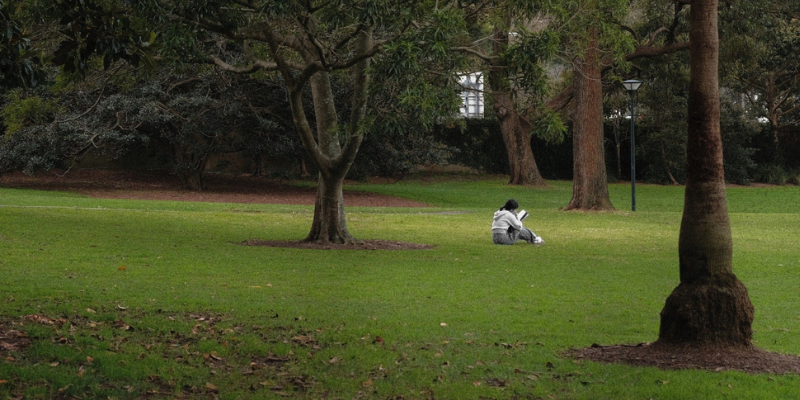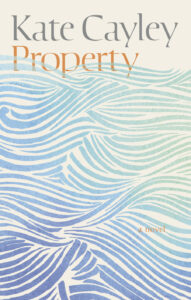
Why We Write the Extra Details
Kate Cayley on the Intersection of Politics, Art, and the Private Self
Some years ago, I saw Yiyun Li interviewed at an event at the Toronto Reference Library. Li, a writer whose stories are compressed and deceptively simple, spoke with humor and a certain hardness, perhaps born of the clarity of unimaginable loss. The interviewer asked a question about understatement in Li’s work, which is largely concerned with domestic life, with the slipperiness of memory, with the impressions and images that return to us in our quietest moments, over and over, to be considered but not necessarily understood or sentimentally redeemed. Li described herself as having a lifelong suspicion of all forms of emotional melodrama, stemming from her experience as a child in China listening to propagandist operas, in which singers made extravagant claims of adoration and allegiance. She laughed, quoting Mother, when I die, bury me facing the red sun of Chairman Mao.
Watching her laugh, I believed she had come to think of understatement, of evasion and a modesty of focus, as something set against the blunt force of totalitarianism, in which hyperbole, the rush of feeling brought on by rhetorical flourishes and ardent certainties, is a way of stifling dissent. Carried away by the pleasure of our own emotions, it becomes difficult to have second thoughts.
We are struck by what is extra, by the stubborn eccentric thing that can’t be flattened into an obvious meaning or an easy identity category.
This is a memory I keep returning to when thinking about the politics of literary fiction, which is a loose term that I’m using to mean fiction concerned with the strange and singular interiority of humans, with whatever is precise and inexplicable and private. I recently attended a craft talk by Shyam Selvadurai in which he talked about “the extra detail” that convinces us we are witnessing a life as real as our own. We are struck by what is extra, by the stubborn eccentric thing that can’t be flattened into an obvious meaning or an easy identity category.
He demonstrated this by showing a series of photographs of his own kitchen, each image slightly closer, moving our perception of the room from utterly generic to utterly specific: we began with a tidy space inhabited by two queer men in late middle age, but as he talked his way through each image, something more personal and more complex began to emerge. By the last photograph, I felt I was seeing a portrait of a marriage between two people with their own peculiar histories, known to me, but strange to me in the sense that the reality of another person is always mysterious, a riddle that isn’t meant to be solved.
You could call this a successful imitation of the texture of reality. You could also call it a deeply ethical aspect to fiction, in which you, reading, encounter another, who, like you, can’t be reduced to a type or a demographic. “Literary fiction” (this is placeholder, really), becomes a reminder that the private self, the human self, exists and is worth protecting, even when it’s tempting to ignore what is inexplicably individual in the face of genuinely urgent certainties.
In the last year, I have found myself questioning the point of the small, the subtle, the gently ironic, sharply observed portrait of a group of humans, a particular place, even though that is the kind of work I not only want to write but want to read. But it’s hard to ignore the hunch that it’s all trivial, too personal, not political enough, that in order to meet the moment this fixation on private life and eccentric stray thoughts must be thrust aside.
There’s some truth to this. The sense of crisis is so pervasive that I don’t need to enumerate particulars here. This is a moment to meet, and part of that meeting might be putting away all those fine-grained delicate observations, those small things, in favor of explicit political commitment.
The extra detail is a way to preserve the stubborn particularity of stories, rather than making the story a foregone conclusion in service of whatever position we are trying to defend.
Yet I think this is a trap to apply this to fiction (even as I recognize that I am really just trying to persuade myself of the importance of what I have loved most in the world, other than people). We are slipping towards totalitarianism, in some ways already fallen into it. But one of the lures of totalitarian thinking lies in coherence and melodrama. Everything is the biggest, the most important, the greatest threat, the greatest salvation (the President is a big fan of melodramatic speech).
Like the operas Li recalled, this moment is characterized by a kind of emotional extravagance that does not permit the ambivalent second thought. My feeling that now is not the time to be concerned with the smallness of domestic fiction because it’s trivial is true in a sense (given a world that is metaphorically and actually on fire, who cares?), but it’s also giving up what makes such fiction worthwhile.
The extra detail, the intricate domestic self, the person standing in a kitchen not sure what they believe, is, in a small uncertain way, set against the emotional and ideological coherence that melodrama expresses. The extra detail is a way to preserve the stubborn particularity of stories, rather than making the story a foregone conclusion in service of whatever position we are trying to defend.
Vaclav Havel, in his essay “On Totalitarianism and Stories,” says that if the meaning of history is self-explanatory it loses what makes it history in the first place: ambiguity and uniqueness. He is, of course, addressing socialist realism, art as a tool that educates and guides the public in a correct assessment of the past and the present, pointing us in the direction of a proper future. Stories become an instrument, for change, for growth, for understanding, for ongoing permanent revolution, and so forth. Stories are useful to the state. According to Havel, this usefulness is so successful, so total, that the story, the history, ceases to exist. If you know what a thing means, you have no reason to ponder it. You do not need to interpret it, because it’s been pre-interpreted for you.
I keep returning to Li’s work, and to the work of writers like her, because, reading, I feel I am in the presence of a human riddle, one that I am invited to consider, to observe in helpless awe, but not to solve. There is no solution, only more riddle. When Hamlet, in one of his tantrums, says “you would pluck out the heart of my mystery,” he is defending the riddle. That there is something in the self that will not fit a schema, that will not be laid bare. That cannot be made to serve a strategic purpose, however worthy.
To pretend that art could be divorced from politics is like a fish insisting that they are independent of water.
Just to be clear, I am not repurposing the silly claim that literature is somehow divorced from politics, or ought to be, or even can be. Any version of art for art’s sake has always seemed a little childish to me, a bit of adolescent posturing (the phrase was apparently especially beloved by members of the 19th century Aesthetic Movement, one of the high points of a certain kind of brattiness). Politics is inevitable in art because politics, like art, is just a lively and flexible attention to what is.
To make art that is alive to politics is to make art that is alive to the world. To pretend that art could be divorced from politics is like a fish insisting that they are independent of water. The insistence on what is irreducibly individual is not divorced from political engagement. It is a politics. I think it’s the only claim to politics that art can decently make; it is decent because it is small, modest, does not insist on melodramatic rightness. There’s the famous (and by now clichéd, but that’s hardly his fault) Berger quote “never again shall a single story be told as though it were the only one.” “Literary fiction” (I can’t seem to stop using quotation marks) is a thing that quietly reminds us that ambiguity and uniqueness are precious, because, without them, there is only a single story, which is no story at all.
This is a moment of indecency in political speech. Overstatement, gross exaggeration, outright lying. Politicians (in America and elsewhere) seem to be peddling a vision of history so blunt, so flat, that it’s a late capitalist version of Havel’s totalitarianism that irons out the story. My malaise about the purpose of the art I have loved most is connected to the understandable temptation to answer in kind, to defend a version of reality that is the flipside of the same brutal coin, insisting that literature make itself a tool of what I believe the good fight to be. To make art that serves my own melodrama, that proves my various impassioned points and shows me to be irrefutably in the right.
Throughout my artistic life, I’ve seen a proliferation of statements (often from artists themselves) that art is a revolutionary act, that it serves community, that it amplifies the marginalized, corrects injustice, makes a better world. This makes me uneasy, though of course I also want those things. I want them more now, as the dial has shifted so dramatically that I would think twice before crossing the border with my queer family, that I am afraid for American friends, and for America itself (which as a Canadian, means I am also afraid for my own country: where America goes, we tend to follow).
But I believe these statements fundamentally misunderstand the politics of art, of reading: to be small, to be inward, to be without apparent utility. To, in refusing melodramatic certainties, show us we have selves, rich and strange, unmanageable, worth protecting. Insisting that literature serve an explicit and direct politics seems like giving away the very real politics literature has.
Maybe “politics” is the wrong word. Maybe ethics is closer, an ethics of noticing, of seeing, without certainty and without possession. Not knowing what a thing means, but paying attention anyway. Engaging with books concerned with ambivalence and uncertainty are, almost imperceptibly, a way of remaining ourselves. They are, in the modesty of their aims, a form of resistance, one so subtle as to be ideologically useless, but insisting on uselessness is a resistance, a moral claim. I think that’s what Li meant. Though I can’t be sure. I can just keep reading, stumbling over the mystery without trying to pluck it out.
__________________________________

Property by Kate Cayley is available via Coach House Books.
Kate Cayley
Kate Cayley is a fiction writer, poet, and playwright. She has published two short story collections, three collections of poetry, and a novel, Property (Coach House Books, 2025). Her plays have been performed in Canada, the US and the UK. She has won the Trillium Book Award, the Mitchell Prize for Poetry, and an O. Henry Prize, and been a finalist for the Governor General’s Award for Fiction, among other awards. She was a playwright in residence with Tarragon Theatre, and wrote two plays for Tarragon, After Akhmatova and The Bakelite Masterpiece. She has taught writing and mentored emerging writers at the University of Toronto, Sheridan College, the Humber School for Writers, McMaster University, and the University of Guelph MFA program. She is a frequent writing collaborator with immersive company Zuppa Theatre, most recently on The Archive of Missing Things and This Is Nowhere, and her writing has appeared in Best Canadian Poetry, Best Canadian Stories, Brick, Electric Literature, Joyland, The New Quarterly and North American Review.



















